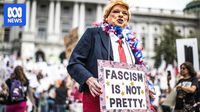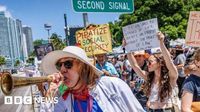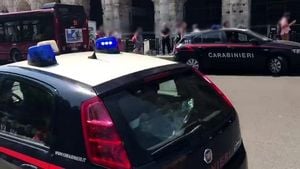Thousands of Americans protested against US President Donald Trump's administration on Saturday, April 19, 2025, decrying perceived threats to democratic ideals. The demonstrations spanned major cities from coast to coast, including Washington, New York, and Chicago, as well as smaller towns in states like Rhode Island, Maryland, and South Carolina. This wave of protests came just two weeks after similar nationwide demonstrations, signaling a growing discontent among citizens.
Protesters gathered in various locations, including a rally in front of the White House and a demonstration at a Massachusetts Revolutionary War commemoration. In Boston, Thomas Bassford, an 80-year-old retired mason from Maine, participated in the re-enactment of the Battles of Lexington and Concord. He expressed his belief that Americans were under attack from their own government, stating, "This is a very perilous time in America for liberty." Bassford attended the event with his partner, daughter, and two grandsons, emphasizing the importance of teaching the younger generation about the origins of the country and the need to fight for freedom.
In Denver, hundreds of protesters gathered at the Colorado State Capitol, holding banners expressing solidarity with immigrants and demanding, "Hands Off." Meanwhile, in San Francisco, protesters formed a human chain to spell out the words "Impeach Remove!" while displaying upside-down American flags, a symbol of distress. The 50501 movement, which organized the "Hands Off" protests, aimed to convey a message to both opposition politicians and ordinary voters that vocal resistance to Trump’s policies was essential. Organizer Heather Dunn noted that demonstrators included registered Democrats, independents, and Republicans, all united by a shared belief in a fair government that prioritizes people over profits.
Across the country, demonstrators voiced their concerns about Trump's administration, which they accuse of civil rights violations and constitutional breaches. Many participants highlighted issues such as the deportation of immigrants and the downsizing of the federal government, which has resulted in thousands of government workers being fired. George Bryant, a Boston resident at the Concord protest, expressed his worry that the president was creating a "police state," holding a sign that read, "Trump fascist regime must go now!"
In Washington, Bob Fasick, a 76-year-old retired federal employee from Springfield, Virginia, joined the rally near the White House out of concern for threats to constitutionally protected due process rights and federal safety-net programs like Social Security. "I cannot sit still knowing that if I don't do anything... the world that we collectively are leaving for the little children... is simply not one that I would want to live in," Fasick said.
The protests also drew attention to the Trump administration's immigration policies. In Columbia, South Carolina, several hundred people protested at the statehouse, while in Manhattan, demonstrators rallied against continued deportations of immigrants, marching from the New York Public Library toward Central Park and past Trump Tower. They chanted, "No fear, no hate, no ICE in our state," referring to the US Immigration and Customs Enforcement.
Marshall Green, a protester from New Jersey, expressed concern over Trump's invocation of the wartime Alien Enemies Act of 1798, claiming the country was at war with Venezuelan gangs linked to the South American nation's government, despite a recent US intelligence assessment finding no coordination between them. "Congress should be stepping up and saying no, we are not at war. You cannot use that," he argued.
In addition to the protests, significant legal developments occurred on the same day. The US Supreme Court ordered the Trump administration to halt the deportation of Venezuelan men in immigration custody in Texas after their lawyers argued they were at imminent risk of removal without judicial review. This decision raises questions about the administration's use of the Alien Enemies Act, an 18th-century wartime law.
Furthermore, an immigration judge ruled that the case of Aditya Wahyu Harsono, a 33-year-old Indonesian father of an infant with special needs, can proceed. Harsono was detained by federal agents in Minnesota after his student visa was secretly revoked. His next hearing is scheduled for May 1, 2025.
In political news, Barbara Lee, a trailblazing former member of Congress, has been elected as the next mayor of Oakland, California. She defeated former city council member Loren Taylor after nine rounds of ranked-choice voting, securing more than 52% of the vote to Taylor's 47%. Lee's victory comes at a critical moment for the Bay Area city.
Meanwhile, JD Vance, the vice president, had an "exchange of opinions" with the Vatican's secretary of state regarding current international conflicts and immigration. The Vatican has expressed alarm over the Trump administration's crackdown on immigration and cuts in international aid, maintaining its tradition of diplomatic neutrality.
In educational matters, Harvard University swiftly rejected a series of demands put forth by the Trump administration within 72 hours, setting up a high-stakes showdown between the prestigious institution and the White House. The university's response followed mounting pressure from faculty, students, and alumni, who urged it to defend itself against what they viewed as an unprecedented attack from Washington.
As protests continue to unfold across the nation, public sentiment appears to be shifting. Advocates for various causes are increasingly vocal about their concerns, from environmental issues to social justice. The Trump administration's policies have galvanized a diverse coalition of Americans, united in their demand for change.
As the nation grapples with these challenges, one thing remains clear: the voices of dissent are growing louder, and the push for democratic ideals and civil rights will continue to resonate in the streets.






